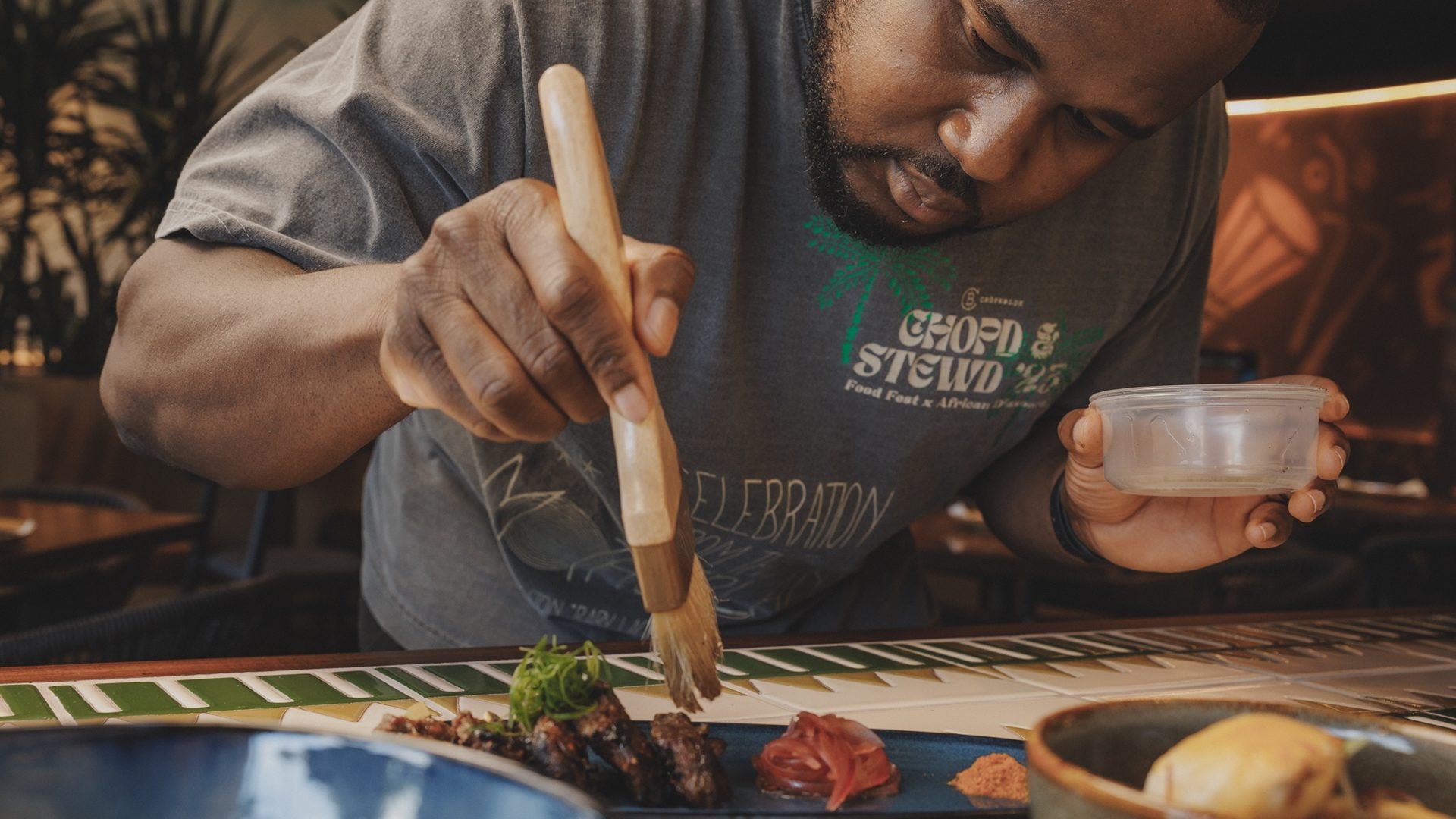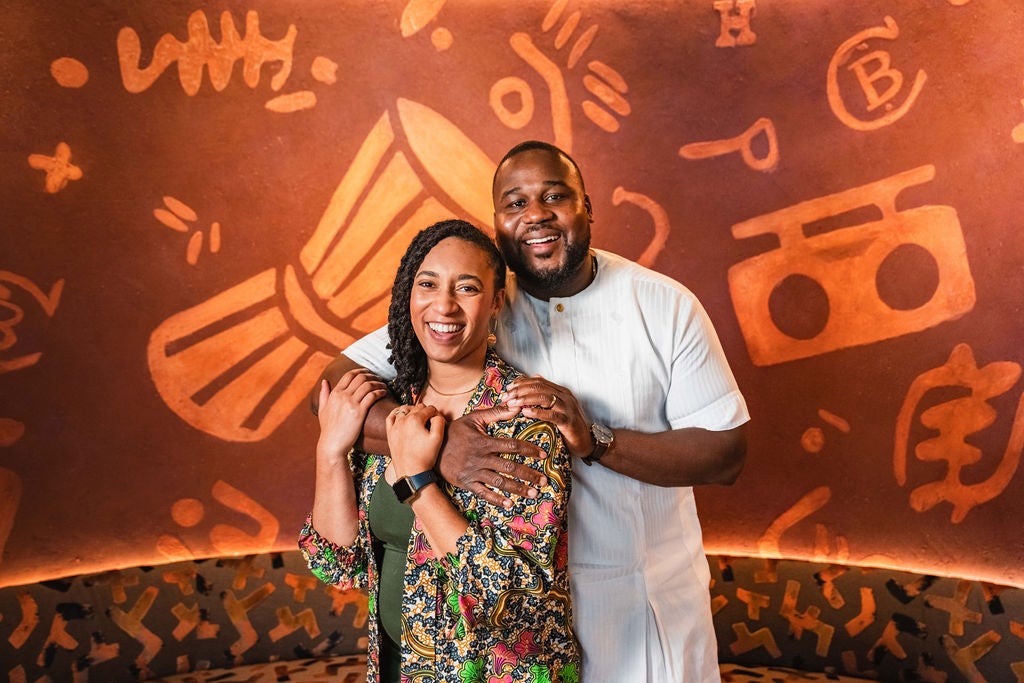
It’s no coincidence that Houston’s beloved West African fast-casual eatery, ChòpnBlọk, is opening just in time for Nigerian Independence Day—an intentional move by owner Ope Amosu. The new standalone restaurant is the realization of a collection of ideas that have come to fruition. ChòpnBlọk began as a pop-up and later found a home in Houston’s Post Market. Today, the restaurant has expanded into its own dedicated space, continuing its mission to bring West African flavors to the masses.

It makes sense considering that Houston is home to the largest Nigerian population outside of Nigeria. The population has formed a strong community, with established neighborhoods throughout the south west area of the city, where Nigerian culture thrives. It’s where Amosu, a 2024 James Beard Award Semifinalist for Emerging Chef, grew up.
As a child, sitting around the dinner table was where Ope Amosu and his family bonded over meals—a tradition that left a lasting impression on him, even if he didn’t realize it at the time. That sense of connection, community, and fellowship would eventually inspire the creation of ChòpnBlọk.
Even before launching his restaurant, Amosu’s connection to food was undeniable. In grade school, he recalls mixing mayonnaise, ketchup, and mustard in the cafeteria, dubbing the creation ‘Ope Sauce.’ By high school, his entrepreneurial spirit kicked in as he baked and sold Otis Spunkmeyer cookies to his classmates. Nonetheless, he’d take that ingenuity and put it into academia. Raised by African parents, Amosu opted for a more traditional route in school, earning degrees in business and entrepreneurship, working his way up into the oil and gas industry.
Until one day, it changed.
“When I had the idea in 2017, my parents were the first people I called. I was actually at a work conference. On my way to the conference, I saw a sign for an Italian street kitchen, and that’s when I was like, ‘I’m going to do this,’” Amosu tells ESSENCE. “I get to the work conference, and I can’t pay attention to anything they’re talking about. I’m looking stuff up, and I started seeing all these modern renditions of our traditional cuisine that different food bloggers were putting together. So when the conference was on break, I called my parents, [and asked them] ‘What are your thoughts on seeing people doing these, like adaptations of our food?’ And they thought it was an amazing idea. They didn’t realize that I was asking for myself.”

As time went by, he confessed to his parents that he was going to go into the restaurant business. While his parents’ response to this success of the restaurant is much different now, Amosu laughably recalls them saying, “You went to grad school at Rice, not to be cooking rice!”
ChòpnBlọk pays homage to Amosu’s heritage in a myriad of ways, starting with the name itself. Amosu wanted the name of his restaurant to reflect the culture, while also being broad enough to appeal to all, without confining it to a narrow perception of African cuisine. He was inspired during a road trip with his wife, driving from Austin to Dallas where they passed a sign advertising “fresh meat off the chopping block.” The phrase stuck with him, not only because of its connection to West African outdoor cooking traditions, but also due to its deeper meaning. In West Africa, “chop” means “to eat” in Pidgin English, so “ChòpnBlọk” became the perfect way to represent a welcoming place to enjoy great food, while paying homage to his roots.

Amosu envisions ChòpnBlọk as more than just a restaurant—it’s a mission-based business built on three key pillars. First, the stores themselves, which he views as community centers where people can gather and connect daily. Second, is community engagement, supported by programs aimed at fostering deeper connections. Lastly, there’s a storytelling pillar that shines a light on individuals advancing the community. To amplify this, they’re launching a digital platform called “Smallchops,” featuring snackable stories that extend the ChòpnBlọk experience beyond the restaurant and engage audiences on social media.
“Here where we’re located, is part of the historic Freedmen’s Town. It’s also a really important component to us, because it is really like continuing to celebrate our Black heritage and who we are as Black community in spaces where it doesn’t really get recognized as much,”Amosu points out. The restaurant’s new digs are located in Houston’s Fourth Ward, a vibrant area steeped in history and culture, a testament to the resilience and creativity of the Black community that has thrived here for generations.

The interior design of ChòpnBlọk is both an extension and reflection of its three foundational pillars. As the design team adds the final touches ahead of the restaurant’s grand opening on September 28, the sounds of Tems and Burna Boy fill the air, setting the tone for a vibrant atmosphere. The traditional African decor is thoughtfully complemented by books and vinyls that speak to culture and heritage. Titles like I Too Sing America, My Everyday Lagos, and cookbooks such as In Bibi’s Kitchen are displayed alongside vinyl records from Sade, Solange, and Wale, further enriching the space with layers of African and diasporic artistry.

Amosu emphasizes that the selection of books at ChòpnBlọk is the result of a collaboration with Kindred Stories, a Black-owned bookstore in Houston, and what he calls “friends of the block”—partners who are doing amazing things in the community. These books aren’t just decor but serve as a conversation between Kindred Stories’ space and the restaurant’s. Amosu and his team carefully curate the titles in partnership with the bookstore, ensuring the selection remains fresh each season. The goal is for customers to not only enjoy the ambiance but also leave with a book in hand.
“I wanted people to be able to see and feel the embrace that the Motherland has to offer and the beauty of that part of the world. It’s also a space of reclamation, because this space is helping to outwardly shine light on stories and connections that were systematically meant to be destroyed forever. We’re doing it on Westheimer, we’re doing it in Montrose. We’re doing it in a place where you don’t have to go outside of your way to try to tap in,” Amosu says. “The way we curated it, is to feel like you’re walking into a warm hug, and there’s a lot of familiarity.”

The beauty of ChòpnBlọk is that even if you’re new to West African cuisine, the menu is approachable and bursting with flavor, ensuring you can’t go wrong. You know a place is worth visiting when a dish tastes just as good cold as it does fresh off the stove.
The new Montrose location of ChòpnBlọk brings an expanded culinary vision to life, introducing exclusive new dishes alongside fan favorites like The Motherland and Trad Blọk Pairings. The latest menu refresh pays homage to Nigerian culinary staples and the diverse influences of West African cuisine, with each dish telling a story of heritage and flavor. A highlight is the Buka Blọk Pairing, which presents a sumptuous West African red stew, artfully complemented by steamed rice and beans, and adorned with tender, boneless short ribs. This dish is a nostalgic nod to the weekly red stews that Amosu fondly remembers from his childhood meals, embodying warmth and familial comfort. Equally noteworthy is Aunty Mawa’s Maafe, a luscious Senegalese peanut curry born from a collaboration with Mawa McQueen, a celebrated James Beard semi-finalist and Ivory Coast native who champions the culinary arts at Aspen’s only Black-owned restaurant. Lastly, the Black Star Blọk Pairing elegantly marries coastal flavors with its vibrant ensemble of Waakye fried rice, succulent Ikoyi shrimp, and aromatic Yassa curry, a true tribute to the culinary richness of Ghana. Each offering not only delights the palate but also honors the cultural narratives woven into the fabric of West African gastronomy.

The small chops were tasty too—the Polo Club Suya stands out as a must-try, featuring expertly marinated steak skewers that are served alongside a vibrant Yaji pepper spice, truly capturing the essence of one of Nigeria’s delicious street foods. The dish beautifully balances its bold flavors with the signature taste of tomato, thanks to Amosu’s meticulous attention to authentic spices.
Amosu’s commitment to quality ingredients and vibrant flavors is palpable, and he takes evident pride in ensuring that this dedication does not go unnoticed. He notes that there are clear similarities, highlighting the shared lineage and numerous ties between Black Southern American culture and the developments taking place on the continent.
ChòpnBlọk Montrose is a cultural crossroads—inspired by the rich artistry, textiles, and architecture of West Africa, each element within the restaurant serves not only as a visual delight but also as a reflection of the communal and artistic expressions that are integral to its culture. This thoughtful design fosters a profound sense of belonging and connection for every guest, transforming the dining experience into a celebration of heritage and unity. Ultimately, ChòpnBlọk is a tribute to Black identity and a gathering place that honors the past while looking forward to the future.
“You may come in for a meal, but you’re going to leave with so much more,” Amosu concludes.